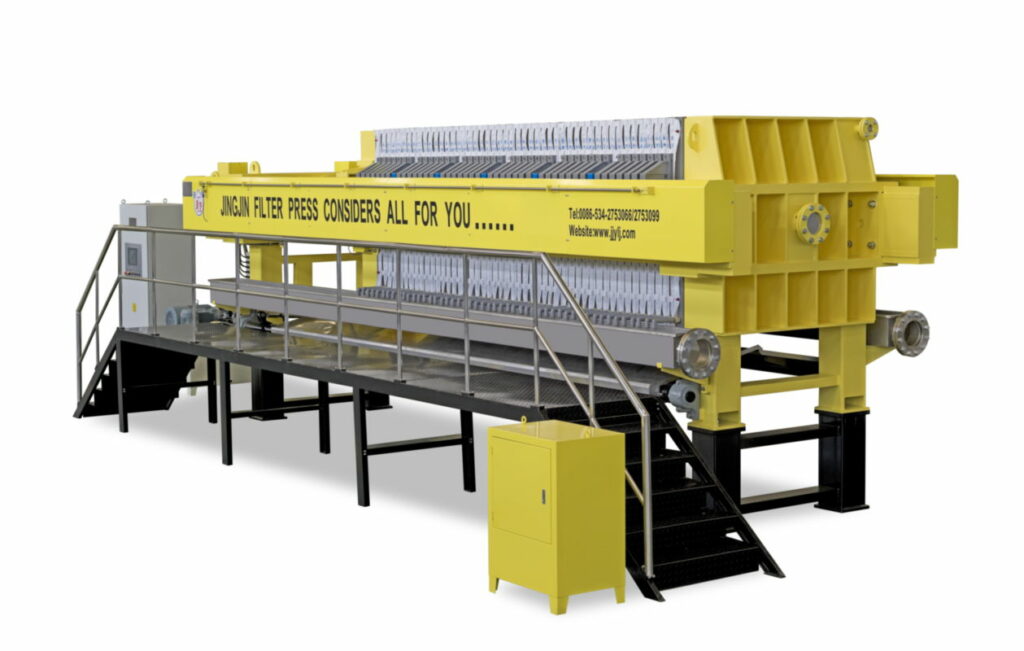Filter presses are a popular piece of equipment used in various industries for solid-liquid separation. When looking for a filter press for sale, it is important to choose the right one for your specific needs.
Here are some key factors to consider when selecting a filter press:
Filtration area: The filtration area is the total surface area of the filter press plates that are used for filtration. The filtration area is an important factor in determining the capacity of the filter press. Generally, larger filtration areas are required for higher volumes of solids to be processed.
Filter plate size: The size of the filter plates is an important factor to consider as it affects the overall size of the filter press and the filtration area. Larger filter plates can be used to increase the filtration area, but they may also require more space and higher pumping pressures.
Plate material: The material of the filter plates is important in determining the chemical compatibility, temperature resistance, and abrasion resistance of the filter press. Common plate materials include polypropylene, cast iron, and stainless steel.
Plate type: Filter press plates come in different types, such as recessed chamber, membrane, and plate and frame. The type of plate chosen will depend on the specific application and the desired filtration efficiency.
Filter cloth: The filter cloth is an important consideration as it affects the filtration efficiency of the filter press. The filter cloth should be selected based on the particle size and type being filtered, as well as thedesired filtration rate and cake release properties.
Cake thickness: The thickness of the filter cake is an important factor in determining the filtration rate and overall efficiency of the filter press. Thicker filter cakes can reduce the filtration rate but can also lead to a drier cake with better solids capture.
Automation: Automatic filter presses offer a range of benefits, such as higher efficiency, reduced labor costs, and improved safety. However, they may also be more expensive and require specialized training and maintenance.
Maintenance: The maintenance requirements of the filter press should be considered, including the frequency of cleaning, replacement of parts, and overall durability of the equipment.
Cost: The cost of the filter press is an important consideration and will depend on the size, type, and features of the equipment. It is important to consider the long-term cost-effectiveness of the filter press, including factors such as efficiency, reliability, and maintenance requirements.
When looking for a filter press for sale, it is important to select one that is appropriate for the specific application and requirements. Consulting with a filtration expert can help to determine the best filter press for a particular application. Popular brands of filter presses include Evoqua Water Technologies, Micronics, and Andritz.
What are the most common maintenance requirements for filter presses?
Filter presses require regular maintenance to ensure their proper functioning and longevity.
Here are some of the most common maintenance requirements for filter presses:
Cleaning: Regular cleaning of the filter press is important to remove any accumulated debris or solids that may interfere with the filtration process. The frequency of cleaning will depend on the specific application and the amount of solids being processed.
Inspecting filter plates and cloths: Monitoring the condition of the filter plates and cloths is important to ensure their proper functioning. A Guide to Choosing the Right Filter Press for Sale Any damaged or worn plates or cloths should be replaced promptly to avoid reduced filtration efficiency or leakage.
Lubrication: Regular lubrication of the moving parts of the filter press, such as the hydraulic cylinder and the plate shifter, is important to ensure smooth and efficient operation. Lubricants should be selected based on the specific application and the manufacturer’s recommendations.
Tightening bolts and nuts: Bolts and nuts on the filter press should be checked regularly to ensure they are properly tightened. Loose bolts or nuts can cause leaks or damage to the equipment.
Replacing hydraulic oil: Regular replacement of the hydraulic oil is important to maintain the proper functioning of the hydraulic system. The frequency of oil changes will depend on the specific application and the manufacturer’s recommendations.
Inspecting the feed pump: The feed pump is an important component of the filter press and should be inspected regularly to ensure its proper functioning. Any damage or wear should be addressed promptly to avoid reduced filtration efficiency orleakage.
Monitoring pressure gauges: Pressure gauges on the filter press should be monitored regularly to ensure that the pressure is within the desired range. If the pressure is too high or too low, it can indicate a problem with the filter press or the filtration process.
Checking valves and seals: Valves and seals on the filter press should be checked regularly to ensure they are functioning properly and are not damaged or leaking.
Conducting regular maintenance checks: Regular maintenance checks, such as those outlined in the manufacturer’s manual, should be conducted to ensure the proper functioning of the filter press and address any issues before they become more serious.
Training personnel: Proper training of personnel on the operation and maintenance of the filter press is important to ensure that it is being used correctly and that any maintenance issues are addressed promptly.
In summary, regular maintenance of filter presses is important to ensure their proper functioning and longevity. Maintenance requirements may include cleaning, inspecting filter plates and cloths, lubrication, tightening bolts and nuts, replacing hydraulic oil, inspecting the feed pump, monitoring pressure gauges, checking valves and seals, conducting regular maintenance checks, and training personnel. The specific maintenance requirements will depend on the type of filter press and the specific application, so it is important to consult the manufacturer’s manual and seek expert advice when necessary.
